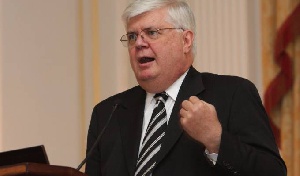 Mr. Stephen Hayes, President of Corporate Council on Africa
Mr. Stephen Hayes, President of Corporate Council on Africa
As many as 10 power-focused United States-based companies are exploring investment opportunities in the country's power sector, as government sets the tone for more independent power producers (IPP) to address the power supply gap.
Mr. Stephen Hayes, President of The Corporate Council on Africa said: "There is big interest from a lot of American companies on the Council. We have ten companies who build power plants, and they are all looking at Africa.
"Power is something that we are really looking at. We do have some companies that are starting to look at the opportunities. But to me it is moving too slowly; it does take some time to build a power plant, but it is taking too much time getting to agreement."
Mr. Hayes was speaking to the B&FT on the sidelines of a breakfast meeting between the Council and a delegation from Ghana and South Africa, officially bringing to the Council’s attention the new South African Airways' service between Accra and Washington, DC.
The Council is one of the most influential US-based organisations, made up of top US companies spearheading strengthening and facilitating commercial relations between the United States and African continent.
The county is facing serious power supply challenges. This has largely been attributed to poor water inflow into the largest power source, the Akosombo reservoir, for hydro power generation. With a minimum operating level of 240 feet, the reservoir as at Wednesday August 5, 2015 had dropped to 237.38 feet.
Installed thermal plants have a total capacity of 2,546 megawatts; about 1,250MW of the installed plants are hydro; and the rest are thermal plants that can run on both crude oil and gas.
However, challenges with the gas compression system on the FPSO Kwame Nkrumah has led to a cut in supply of gas -- from offshore Cape Three Points to the Ghana Gas processing plant sited at Atuabo in the Western Region -- to be processed and supplied to VRA for power-generation.
Unreliable volumes of gas supply from Nigeria have left the Power Ministry with very little room to navigate the current energy crisis, as industries limp in the face of high operational costs brought on by unavailable power.
Government is to take delivery of emergency power barges by September, as it works toward a medium- to long-term solution for the chronic problem.
As Mr. Hayes notes: "We are one of the senior partner on President Barack Obama's Power Africa Initiative. Our President got it right and there is not a single country in Africa -- including Ghana and South Africa -- that is meeting all its current energy needs".
He believes that both American companies and African governments need to do things with urgency to solve the power problem in Africa and speed up development.
"The problems are on both sides. We [American companies] are moving too slowly in Africa and I think African governments need to open-up and move things. The bureaucracy is really very slow in many countries. There are too many hurdles and they [African governments] have to streamline the process soagreements can be made far more quickly.
“It just takes too long and companies run out of time and money, and they just go elsewhere. African governments must cut down on bureaucracy, which historically is a very hard thing to do in parts of Africa."
President Obama in 2013 launched ‘Power Africa’, a private sector-led initiative aimed at doubling electricity access in sub-Saharan Africa, with US$300million in assistance per year to expand the reach of ‘Power Africa’ across the continent in pursuit of a new aggregate goal of 30,000 MW additional capacity for Africa; and increasing electricity access by at least 60 million household and business connections.
South African Airways (SAA) now operates direct flights from Accra to Dulles International Airport, Washington DC, four times per week.
The flights are operated on Mondays, Tuesdays, Thursdays, and Saturdays, departing Accra 10:45pm and arriving at Washington Dulles Airport 6:05am the next day.
The flight is operated on an Airbus A340-600 with a two-class configuration. It has total seating capacity of 317 passengers -- with 42 flat-bed seats in Business and 275 Economy Class seats. From Accra, passengers can enjoy local dishes such as waakye and fried plantain on the flight.